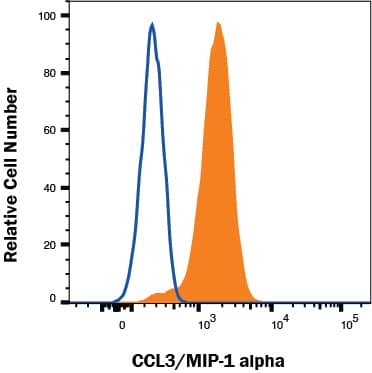Mouse CCL3/MIP-1 alpha Antibody
R&D Systems, part of Bio-Techne | Catalog # MAB450


Key Product Details
Species Reactivity
Validated:
Cited:
Applications
Validated:
Cited:
Label
Antibody Source
Product Specifications
Immunogen
Ala24-Ala92
Accession # P10855
Specificity
Clonality
Host
Isotype
Scientific Data Images for Mouse CCL3/MIP-1 alpha Antibody
Detection of CCL3/MIP-1 alpha in J774A.1 cells treated with 1µg/mL LPS and monensin for 5 hrs by Flow Cytometry
J774A.1 cells treated with 1µg/mL LPS and monensin for 5 hrs (filled histogram) and resting J774A.1 cells (open histogram) were stained with Rat Anti-Mouse CCL3/MIP-1 alpha Monoclonal Antibody (Catalog # MAB450) followed by Allophycocyanin-conjugated Anti-Rat IgG Secondary Antibody (Catalog # F0113). To facilitate intracellular staining, cells were fixed with Flow Cytometry Fixation Buffer (Catalog # FC004) and permeabilized with Flow Cytometry Permeabilization/Wash Buffer I (Catalog # FC005). View our protocol for Staining Intracellular Molecules.Applications for Mouse CCL3/MIP-1 alpha Antibody
Flow Cytometry
Sample: J774A.1 cells treated with 1ug/mL LPS and monensin for 5 hrs
Western Blot
Sample: Recombinant Mouse CCL3/MIP-1 alpha Isoform LD78a (Catalog # 450-MA) under non-reducing conditions only
Formulation, Preparation, and Storage
Purification
Reconstitution
Formulation
*Small pack size (-SP) is supplied either lyophilized or as a 0.2 µm filtered solution in PBS.
Shipping
Stability & Storage
- 12 months from date of receipt, -20 to -70 °C as supplied.
- 1 month, 2 to 8 °C under sterile conditions after reconstitution.
- 6 months, -20 to -70 °C under sterile conditions after reconstitution.
Background: CCL3/MIP-1 alpha
The macrophage inflammatory proteins 1 alpha and 1 beta, two closely related but distinct proteins, were originally co-purified from medium conditioned by a LPS-stimulated murine macrophage cell line. Mature mouse CCL3/MIP-1 alpha shares approximately 77% and 70% amino acid identity with human CCL3/MIP-1 alpha and mouse CCL4/MIP-1 beta, respectively. MIP‑1 proteins are expressed primarily in T cells, B cells, and monocytes after antigen or mitogen stimulation. The MIP‑1 proteins are members of the beta (C‑C) subfamily of chemokines.
Both CCL3 and CCL4 are monocyte chemoattractants in vitro. Additionally, the MIP‑1 proteins have been reported to have chemoattractant and adhesive effects on lymphocytes, with CCL3 and CCL4 preferentially attracting CD8+ and CD4+ T cells, respectively. CCL3 has also been shown to attract B cells as well as eosinophils. MIP‑1 proteins have been reported to have multiple effects on hematopoietic precursor cells, and CCL3 has been identified as a stem cell inhibitory factor that can inhibit the proliferation of hematopoietic stem cells in vitro as well as in vivo. In the same assays, CCL4 was reported to be much less active. The functional receptor for CCL3 has been identified as CCR1 and CCR5.
References
- Menten, P. et al. (2002) Cytokine Growth Factor Rev. 13:455.
Alternate Names
Entrez Gene IDs
Gene Symbol
UniProt
Additional CCL3/MIP-1 alpha Products
Product Documents for Mouse CCL3/MIP-1 alpha Antibody
Product Specific Notices for Mouse CCL3/MIP-1 alpha Antibody
For research use only